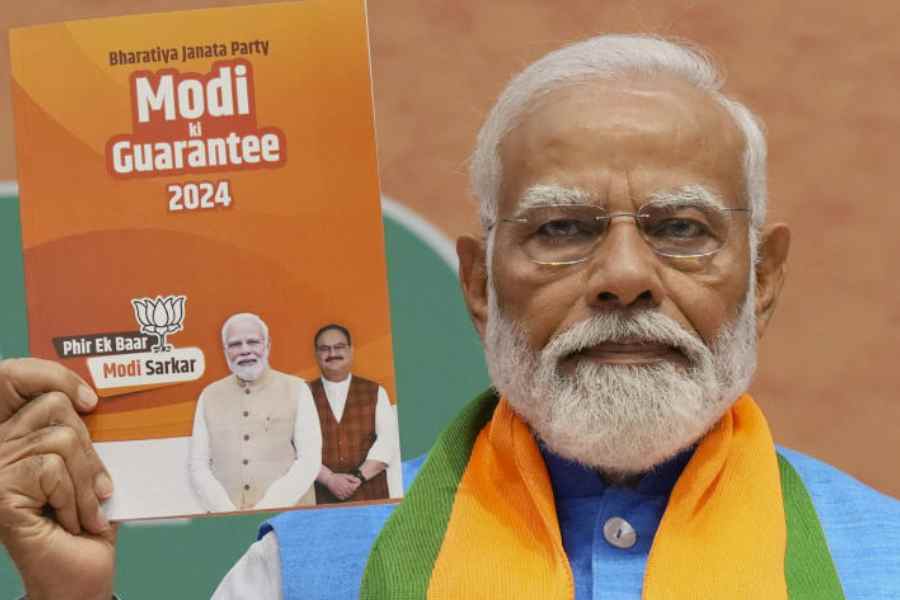Prime Minister Narendra Modi on Sunday appeared to allude to the West Asia conflict to stress the need for a “strong and stable government with full majority” in an uncertain world, as he released the BJP’s manifesto for the general election.
While the document stressed the continuance of welfarism, it also promoted two controversial measures: a uniform civil code and one-nation-one-election.
However, it contained a glaring omission: there was no mention of updating the National Register of Citizens countrywide — a promise made in the 2019 manifesto that flagged illegal migration in border states like Bengal.
“We will expeditiously complete the National Register of Citizens process in these areas on priority. In future we will implement the NRC in a phased manner in other parts of the country,” the 2019 manifesto had said.
Asked why the NRC had been left out, BJP leaders involved in preparing the manifesto refused to comment. Informally, one leader said the government was committed to implementing the Citizenship (Amendment) Act, and then vaguely added that the NRC would follow according to the provisions in the law.
The manifesto said efforts were on to “remove AFSPA (Armed Forces Special Powers Act) in a phased manner” from disturbed areas and resolve inter-state disputes in the Northeast.
Titled “BJP-Modi Ki Guarantee 2024”, with the subtitle “Phir Ek Baar Modi Sarkar”, the 69-page manifesto sought to project Brand Modi as the focal point of this election, pushing the party in the background.
Modi alluded to the current geopolitical tensions to seek a decisive mandate for a third straight term.
“Today, clouds of uncertainty are looming over the world. A warlike situation exists.... In such an atmosphere of crisis, the need for a strong and stable government with full majority becomes even more pronounced,” he said.
“This sankalp patra (manifesto) assures such a government... a bold government that takes challenging decisions in the nation’s interest.”
With the Ram temple built and Article 370 provisions revoked, he manifesto provided a push to two more core BJP agendas.
“The BJP believes that there cannot be gender equality till such time that Bharat adopts a Uniform Civil Code, which protects the rights of all women, and the BJP reiterates its stand to draw a Uniform Civil Code, drawing upon the best traditions and harmonising them with modern times,” it said.
It spoke of making “one nation, one election a reality” and of the framing of a “common electoral roll for all elections”, but without drawing up a timetable.
Modi too said a uniform civil code was in the “national interest” but did not go into details. He said one-nation-one-election would be implemented following the recommendations of the high-powered committee that is going into it.
This apart, the manifesto focused on a developed India or “Viksit Bharat”, and the continuance of welfare policies that have yielded electoral dividends for the BJP by creating a “labharthi” (beneficiary) class of voters.
To a question, party leaders acknowledged that the manifesto committee had received suggestions about taking “bold steps” on population control, an issue close to the RSS-BJP’s heart. However, the manifesto was silent on the subject.
“The focus of the 2024 manifesto is Modi’s guarantee for a Viksit Bharat. We deliberately chose to steer away from highlighting contentious issues,” a BJP leader said, adding that this didn’t mean these issues would not be taken up in the future.
The BJP promised to continue the free ration scheme for 80 crore poor Indians for the next 5 years, as well as the Rs 6,000 annual support to marginal farmers. Modi said this support was necessary to ensure that people who had emerged out of poverty did not slip back into it.
Modi said that in his third term, his government would bring “all citizens aged above 70 — poor, middle class and upper middle class — under the Ayushman Bharat health insurance scheme” that provides an annual hospitalisation coverage of Rs 5 lakh.
Despite unemployment emerging as a key poll issue, the manifesto refrained from making any tall promises on the subject, unlike in the past when the party had promised to create 2 crore jobs a year. Instead, it spoke of making “Bharat a global manufacturing hub and enhance employment in this crucial sector”.
On farmers, too, the manifesto avoided tall claims unlike its 2019 avatar, which had promised to double farmers’ income by 2022 — a claim that fell flat in the face of the farmers’ agitation for legally guaranteed minimum support prices (MSPs).
Instead, the manifesto spoke of “further strengthening” the crop insurance scheme and increasing the MSPs from time to time.










